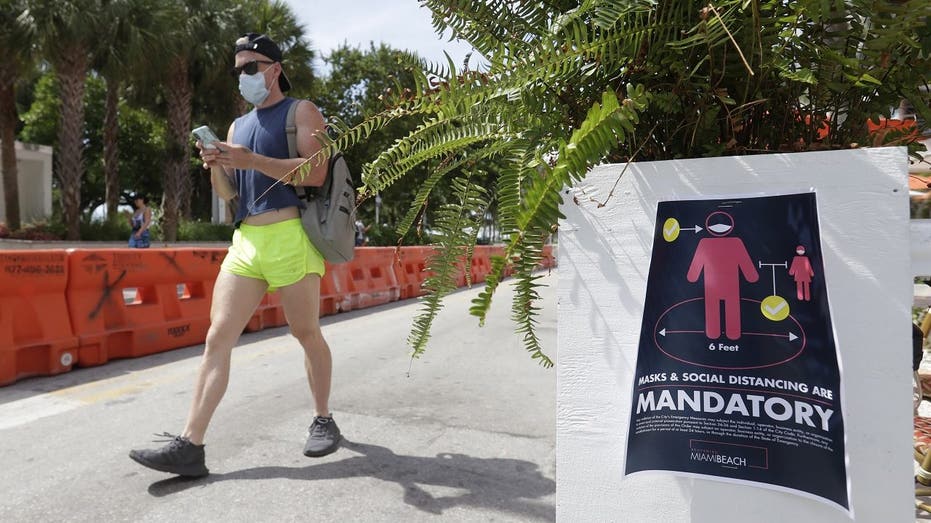Scientists hoped summer temperatures would tamp down COVID-19 cases. What happened?
Case counts of the novel coronavirus are surging in the US
Just a few months back, some scientists hoped summer conditions might help tamp down coronavirus transmission.
Studies have shown simulated sunlight can inactivate the virus on surfaces and in the air, and one study found the virus deteriorates much more quickly in warmer temperatures than in cool temperatures. Some of the other coronaviruses that have long circulated in the population tend to peak in colder months and wane in the summer months, and some thought that summer heat and humidity could work to slow the spread of Covid-19.
US TOPS 3 MILLION KNOWN CORONAVIRUS INFECTIONS
Yet case counts of the novel coronavirus are surging in the U.S., recently hitting another single-day record of new infections.
There are three likely reasons, public-health and infectious-disease experts said. They have to do with the current levels of immunity in the population, how the virus is transmitted and how people behave.
Immunity to Covid-19 in the population is still low, the experts said, giving the virus lots of opportunities to spread. In one study published in the journal Science in May, researchers developed a model to see how seasonal changes in climate might affect the way Covid-19 spreads in cities in the U.S. and around the world.

A pedestrian, wearing a mask to prevent the spread of the new coronavirus, walks down Miami Beach, Florida's famed Ocean Drive on South Beach on July 4, 2020. (AP Photo/Wilfredo Lee)
Instead of running the model based on the limited data available on SARS-CoV-2, the researchers looked at how other, long-circulating viruses have behaved in various climate conditions, including two coronaviruses known to cause common colds. After running their model under several different scenarios, the researchers found that seasonal changes in climate became an important factor in limiting viral spread only after a large part of the population became immune to the virus.
US CORONAVIRUS CASES HIT NEW SINGLE-DAY HIGH AHEAD OF JULY FOURTH WEEKEND
"The main punchline of our paper is that at this early stage of the pandemic, lack of population immunity...dominates any climate effect," said Rachel Baker, an epidemiologist at Princeton University and the lead author of the study.
Even though at least one study has suggested that sunlight can inactivate the virus on contaminated surfaces, scientists said it isn't common to contract Covid-19 that way. Instead, health agencies have identified respiratory droplets as the major mode of transmission -- when a sick person coughs, sneezes or speaks, they expel large fluid droplets that can transfer virus to someone else.
Many researchers have said the new coronavirus can also be transmitted through aerosols, or minuscule droplets that float in the air longer than large droplets and can be directly inhaled. While at least one study has found sunlight can inactivate the virus in the air, infection through virus-containing aerosols is most likely to happen in poorly ventilated, indoor spaces, and such places generally don't get much sunlight.
Which brings up the most important factor of all: Human behavior, experts said, trumps climate altogether.
WIDESPREAD MASK-WEARING COULD PREVENT CORONAVIRUS SECOND WAVES: STUDY
The virus tends to spread best during close-up, person-to-person interactions for extended periods, they said, especially at crowded events, in poorly ventilated areas and in places where people are talking loudly, shouting or even singing.
To limit transmission, public-health experts said people should try to avoid spending extended periods in such places, including crowded indoor bars and restaurants. Public-health experts said people should don masks, stay at least 6 feet apart and practice good hand hygiene.
GET FOX BUSINESS ON THE GO BY CLICKING HERE
"To the extent that there are any seasonal effects, they're washed over by these much stronger, broader effects of whether we're controlling it -- like how good a job we're doing at masking," said Tom Frieden, former director of the Centers for Disease Control and Prevention and chief executive of Resolve to Save Lives, a nonprofit public-health initiative.
Testing and contact tracing are also critical in limiting the spread of Covid-19, experts said, especially as states reopen. States need to monitor the number of new infections and hospitalizations to decide which businesses can remain open and which ones need to pull back, they said.
"What we do determines what the virus does," said Dr. Frieden.




















